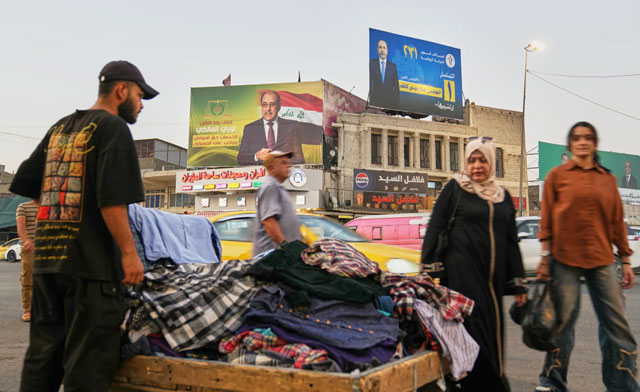Daijiworld Media Network - Baghdad
Baghdad, Oct 24: Iraq is preparing for parliamentary elections on November 11, a vote that could shape the country’s political direction during one of the Middle East’s most sensitive periods in years. While the ceasefire in Gaza has eased some regional tensions, concerns linger over potential conflict between Israel and Iraq’s neighbor, Iran. Iraq remained largely on the sidelines during the brief Israel-Iran war in June.
Iraqi Prime Minister Mohammed Shia al-Sudani, who assumed office in 2022 with backing from pro-Iran parties, is seeking to balance relations with both Tehran and Washington. The upcoming election will decide whether he secures a second term, a rare feat for Iraqi premiers.

A total of 7,768 candidates — 2,248 women and 5,520 men — are vying for 329 parliamentary seats. Major factions include:
• Shiite blocs led by former PM Nouri al-Maliki, cleric Ammar al-Hakim, and groups linked to armed organizations
• Sunni factions led by former parliament speaker Mohammed al-Halbousi and current speaker Mahmoud al-Mashhadi
• Kurdish parties, including the Kurdistan Democratic Party and the Patriotic Union of Kurdistan
The Sadrist Movement, led by influential Shiite cleric Muqtada al-Sadr, is boycotting the elections. Al-Sadr’s bloc had won the most seats in 2021 but withdrew after failed government negotiations. Smaller parties, including the Victory Coalition led by former PM Haider al-Abadi, have also announced boycotts citing corruption concerns.
Reformist groups from the 2019 anti-government protests are participating but face challenges due to internal divisions, funding shortages, and limited political support. Widespread allegations of corruption and vote-buying have surfaced, with political analyst Bassem al-Qazwini describing the election as “the most exploited since 2003 in terms of political money and state resources.”
A campaign insider claimed that candidates are distributing money and buying voter cards, sometimes costing up to 300,000 Iraqi dinars ($200).
The Independent High Electoral Commission has pledged to conduct a fair and transparent process, stating that strict measures are in place to monitor spending and curb vote-buying, and that any candidate found guilty of violations will be immediately disqualified.
Iraq gears up for parliamentary elections amid regional tensions and boycotts
Daijiworld Media Network - Baghdad
Baghdad, Oct 24: Iraq is preparing for parliamentary elections on November 11, a vote that could shape the country’s political direction during one of the Middle East’s most sensitive periods in years. While the ceasefire in Gaza has eased some regional tensions, concerns linger over potential conflict between Israel and Iraq’s neighbor, Iran. Iraq remained largely on the sidelines during the brief Israel-Iran war in June.
Iraqi Prime Minister Mohammed Shia al-Sudani, who assumed office in 2022 with backing from pro-Iran parties, is seeking to balance relations with both Tehran and Washington. The upcoming election will decide whether he secures a second term, a rare feat for Iraqi premiers.

A total of 7,768 candidates — 2,248 women and 5,520 men — are vying for 329 parliamentary seats. Major factions include:
• Shiite blocs led by former PM Nouri al-Maliki, cleric Ammar al-Hakim, and groups linked to armed organizations
• Sunni factions led by former parliament speaker Mohammed al-Halbousi and current speaker Mahmoud al-Mashhadi
• Kurdish parties, including the Kurdistan Democratic Party and the Patriotic Union of Kurdistan
The Sadrist Movement, led by influential Shiite cleric Muqtada al-Sadr, is boycotting the elections. Al-Sadr’s bloc had won the most seats in 2021 but withdrew after failed government negotiations. Smaller parties, including the Victory Coalition led by former PM Haider al-Abadi, have also announced boycotts citing corruption concerns.
Reformist groups from the 2019 anti-government protests are participating but face challenges due to internal divisions, funding shortages, and limited political support. Widespread allegations of corruption and vote-buying have surfaced, with political analyst Bassem al-Qazwini describing the election as “the most exploited since 2003 in terms of political money and state resources.”
A campaign insider claimed that candidates are distributing money and buying voter cards, sometimes costing up to 300,000 Iraqi dinars ($200).
The Independent High Electoral Commission has pledged to conduct a fair and transparent process, stating that strict measures are in place to monitor spending and curb vote-buying, and that any candidate found guilty of violations will be immediately disqualified.